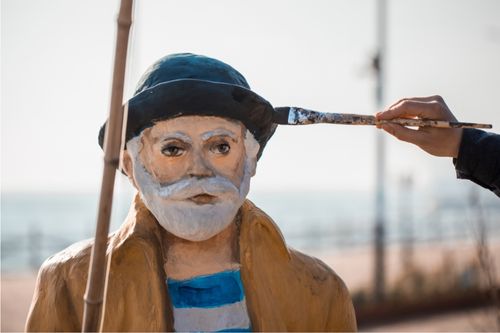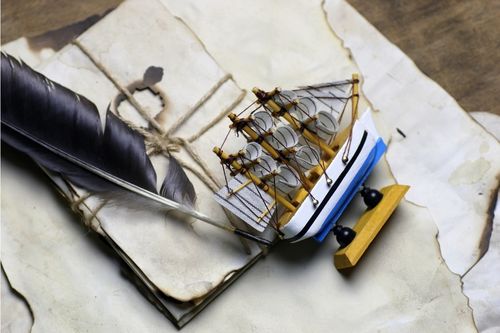Table of Contents
The study of human artifacts found in the harsh maritime environment is known as nautical archaeology. Some universities offer undergraduate courses in naval archaeology, such as historical underwater archaeology and underwater archaeological field methods. Graduate students can pursue a concentration in nautical archaeology, which is also known as underwater or maritime archaeology.
Therefore, the curriculum in nautical archaeology concentrates on the history of the building of wooden ships, maritime trade, cargoes, and ports, as well as the methods employed to record, examine, and preserve the artifacts left behind by these activities.
Marine Archaeology universities and Courses
Bachelor of Arts in Anthropology
For undergraduate archaeology students pursuing a bachelor’s degree in anthropology, possibilities include underwater archaeology minors or elective courses in underwater archaeological field techniques. The availability of these choices at the school will, however, determine this. For students who desire a strong foundation in the underwater environment, some universities offer nautical archaeology degrees with relevant coursework, such as oceanography and maritime history.
Master of Arts in Nautical Archaeology

Graduate students can pursue a Master of Arts in Nautical Archaeology or an underwater-focused Master of Arts in Archaeology. Since few universities offer a master’s degree in nautical archaeology, there is fierce rivalry for graduate positions. A thesis, as well as research on land and in the ocean, are requirements for master’s degree candidates.
Doctor of Philosophy in Nautical Archaeology
Both marine sciences and anthropology programmes offer Ph.D. programmes in nautical archaeology. Advanced study in the preservation of organic material and artifacts is needed for Ph.D. candidates. By taking part in lengthy submarine excavation and research initiatives, they also receive practical experience. Without a master’s degree, students are still eligible to apply to Ph.D. programmes, but they may have to take more hours of coursework.
Few 4-year colleges offer nautical archaeology undergraduate and graduate degree programmes. When choosing the best university to attend, prospective students should take into account elements including SCUBA certification, study abroad options, and programme specialities.
Top colleges for nautical archaeology
Texas A&M University (TAMU)
The graduate programme at TAMU that awards degrees is called the Nautical Archaeology Program (NAP). The Nautical Archaeology School (NAP), a graduate programme at Texas A&M University that awards academic degrees, was established in 1976. The Center for Maritime Archaeology and Conservation has eight laboratories.
University of Florida
The archaeologists at the Florida Museum of Natural History specialize in a variety of fields, including theory, economic anthropology, ethnohistory, environmental archaeology, historic and prehistoric archaeology, and zooarchaeology, in addition to conducting research in the circum-Caribbean region.
Florida State University
Faculty here at FSU conduct extensive archaeological projects at plantations, ships, and Spanish mission sites. Formal courses in underwater archaeology were launched in the early 1970s. Basic scuba certification is available. During the spring semester, training in underwater techniques is offered in addition to the university’s academic diving curriculum. An underwater field school is held every summer, usually concentrating on shipwreck digs from historical eras as well as submerged prehistoric sites. Active field projects may be available all year long.
University of West Florida
Florida’s state government and the University of West Florida have identified 50 underwater locations which are their sites for exploration. About 18 of those have been the focus of investigation by UWF archaeologists, with Spanish colonial ships—including the two shipwrecks at Emanuel Point and the Santa Rosa Island shipwreck—standing out as the most notable.
East Carolina University Maritime History and Nautical Archaeology

A master’s degree in maritime history and nautical archaeology is available through the program. The Maritime Program offers a full education for students interested in a professional career in maritime history and nautical archaeology by combining classroom lectures, seminars, and fieldwork with internships.
Flinders University
Since 1996, the Department of Archaeology at Flinders University has offered undergraduate-level instruction in maritime archaeology. Since 2002, the department has also offered postgraduate-level instruction in the subject.
Bournemouth University Maritime Archaeology Summer School
The English south coast has a rich marine history that includes significant and well-known shipwrecks. This summer school offers a memorable learning experience by combining professional guest lectures with outings and hands-on activities. The classroom-based sessions will cover fundamental concepts of maritime archaeology, including research, archaeological excavation, scientific analysis, conservation and curation of artifacts, publishing your research, and outreach activities. Guest lecturers from government and industry will also be present in addition to our own experts. Additionally, you’ll go on excursions to famous ships and ports including the Cutty Sark and National Maritime Museum in Greenwich, the Mary Rose and HMS Victory in the Historic Dockyard in Portsmouth, and the SS Great Britain in Bristol.
University of Southern Denmark
The University of Southern Denmark is located in Esbjerg on the coast of the Danish North Sea. The programme is globally focused, and all instruction is provided in English. The two-year master’s programme was designed to not only educate you about marine archaeology courses but also to get you ready for a career in it. The course is designed to give students the skills they need for jobs in consulting, archaeological contract work, and heritage management, but it also benefits those who want to pursue more conventional research-focused careers.
At the University of Southern Denmark, students can get an internationally recognized, extremely affordable commercial SCUBA diving qualification. The masters programme offers the opportunity to earn the Danish “SCUBA erhvervsdykker” certificate as it is a recognised commercial diving school (equivalent to HSE SCUBA). Due to Denmark’s free education system, the master’s programme in maritime archaeology is free for students from EU/EEA countries. An annual tuition levy is only applied to non-EU/EEA students.
Key takeaways
- Nautical archaeology is a subfield of marine archaeology courses abroad that studies the design and usage of ships.
- The nautical archaeology programme was started in 1976, the year the Institute of Nautical Archaeology (INA) joined Texas A&M University.
- The degree in Nautical Archaeology introduces students to the most recent research and discoveries in this cutting-edge field of study, making it a highly innovative and fascinating programme of study.
We hope you find this article helpful. Write to us your comments. Click Here to contact us.
Liked this blog? Read next: Epigraphy | History, inscriptions, and purpose
FAQs
Q1. Is nautical archaeology challenging?
Ans – It can be expensive to examine underwater at all, therefore researchers need to find divers (who are frequently also archaeologists) who are skilled at properly documenting and handling delicate artifacts. A mission can be hindered by the weather and the tides.
Q2. How much do nautical archaeologists get paid?
Ans – In the US, an underwater archaeologist has an average salary of $71,395. The highest average annual salary for underwater archaeologists is $107,409 in San Francisco, California, which is 50% higher than the national average.
Q3. What equipment do nautical archaeologists use?
Ans – The same hand tools that are used to excavate sites on land are also utilized underwater, including hand trowels, square units, clipboards, pencils, and tape measures.







